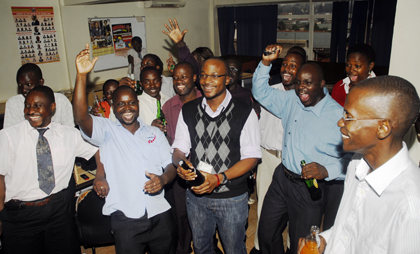No one was happier about the ruling than Uganda’s most well-known–and most prosecuted–journalist Andrew Mwenda, who runs The Independent newsmagazine. Mwenda has a total of 25 criminal charges pending against him linked to his critical reporting and outspoken political commentary. “I feel extremely, extremely happy,” he told me.” I am relieved.”
Following his arrest and a sedition charge in 2005 over radio commentary critical of the government, Mwenda, together with the East African Media Institute, challenged the constitutionality of two charges: sedition and “promoting sectarianism.” The action triggered a suspension of all prosecutions under these charges pending the outcome of the constitutional review.
At Mwenda’s former newspaper, The Monitor, journalists took a moment to celebrate with champagne. “We’ve been in a celebratory mood,” News Editor Alex Atuhaire said.
The reaction of another prominent journalist was more restrained. Kalundi Robert Sserumaga is a radio personality in Uganda, but, save for one interview, his voice has not been heard on the airwaves here since he appeared on one of this talk shows on September 11, 2009. That day, security forces violently crushed popular anti-government rioting while authorities swiftly yanked four radio stations off the air, two of which are still banned. Commenting on the government’s handling of the crisis, Sserumaga harshly criticized President Yoweri Museveni. It led to his being charged with six counts of sedition.
Reacting to the ruling, Sserumaga expressed surprise, relief, and concern. “I’m very pleased. It’s actually quite unexpected,” he said, explaining that he had feared political interference in the case and that he hadn’t expected this level of judicial independence. The timing of the ruling, only a few months ahead of next year’s general elections, was even more perplexing, he said, since it deprived the government of “a standard weapon against opposition and journalists.” Like all the journalists facing sedition charges, Sserumaga has been free under bail conditions that require him to report to court once a month. “I’ve been going once a month,” he said, “for a crime that no longer exists.”
Uganda Record news website Editor Timothy Kalyegira, who has been reporting to court once a week since late July, also described living in a legal limbo. “I’m in that no-man’s-land,” he said. “I’m still being watched under the old law. How much longer will I keep going until this law becomes a laughingstock or I am made a laughingstock?” Police seized Kalyegira’s laptop computer, a cell phone, and his passport, and demanded the passwords to his e-mail accounts after he posted articles raising questions about the July 11 terrorist attacks in Kampala. Since then, a judge has issued an injunction prohibiting the press from reporting on the official government investigations.
Journalists told CPJ they did not believe Wednesday’s ruling was a game-changer in terms of relations between the media and the government. “On paper, it’s a symbolic, very powerful victory,” said Kalyegira. “But government can still find ways to arrest you.”
The deadly 7/11 suicide bombings gave the Ugandan government the impetus to push through parliament the sweeping Interception of Communications Law–the 2002 Suppression of Terrorism Act passed after 9/11 already criminalized news deemed vaguely as “likely to promote terrorism.” Prior to the blasts, authorities were already preparing a restrictive media bill that would among other things criminalize critical reporting the state deems “economic sabotage.”
Notwithstanding, journalists are fighting back. There is a consensus that more press battles laid ahead in Ugandan courts. Mwenda, who successfully challenged the offense of “publishing false news” in 2004, told CPJ he plans to appeal to the Supreme Court to reverse Wednesday’s judgment upholding the constitutionality of the offense of “promoting sectarianism.” The Supreme Court is also expected to issue a ruling on the petition of four Monitor journalists who are challenging the constitutionality of the offense of criminal libel after they were charged in 2008.
Sserumaga is behind an even more ambitious legal counterattack seeking redress for his September 2009 arrest and detention. He is suing the police and the government for unlawful arrest and petitioning the constitutional court on a point of law: Can someone face prosecution if their arrest was unlawful? At the same time he is suing the government-controlled Broadcasting Council for abuse of power and asking the constitutional court to review the limits of its powers. The president of the council banned Sserumaga from the airwaves–without notice or hearing, just by way of a letter addressed to his station’s management–after his arrest.
Meanwhile, the government is also facing litigation over the ongoing closure of prominent broadcaster Central Broadcasting Station. “We want to gradually close opportunities the government has been using to harass journalists,” said Sserumaga.
